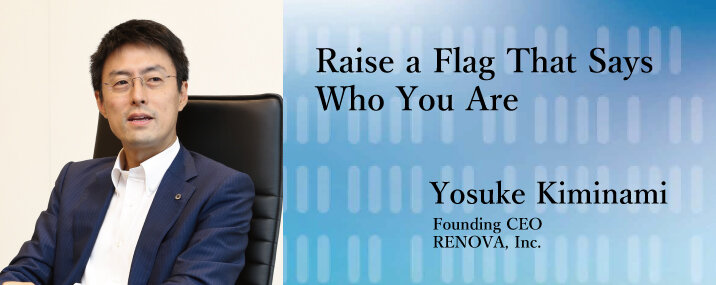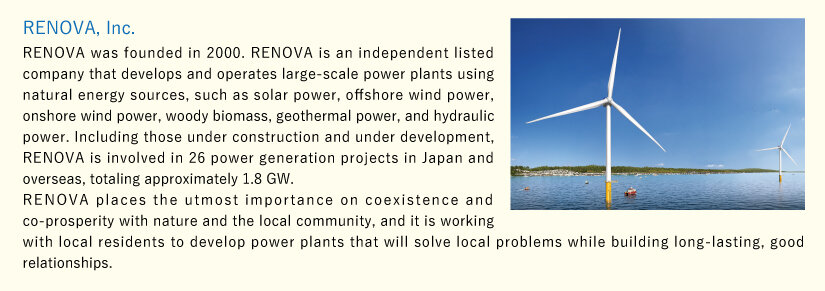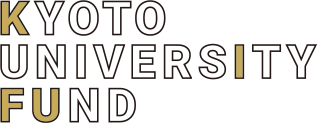Vol.27 Interview with Donors

Yosuke Kiminami
Born in Hyogo Prefecture in 1974. Graduated from Kyoto University's Faculty of Integrated Human Studies in 1998. Majored in environmental policy theory, and minored in material environment theory. Established Media Max Japan Inc. in 1997 while still attending school and became the representative director. After working at McKinsey & Company, Inc. Japan in 1998, established RENOVA, Inc. (former company name: Recycle One, Inc.) in May 2000 and became president.
Q You are from the first class of graduates of the Faculty of Integrated
Human Studies. Why did you apply to the Faculty and what
were your impressions after entering the Faculty?
When I was in my second year of high school, I saw a newspaper article saying that the Faculty of Integrated Human Studies would be newly established. The article said, "We aim to conduct interdisciplinary research and take a problem-solving approach," and I thought, "This is where I want to study." It struck a chord with me because I felt that my interest in environmental issues and the other academic fields of the University were not linked. I have always wondered about the arrangement where we damage nature by doing as we wish and thereby become unable to continue doing as we wish.
I entered the Faculty of Integrated Human Studies thinking, "This is it." However, there were both enjoyable and difficult aspects. The enjoyable aspect was that all students had unique characteristics. When already there were many people who had come to Kyoto University to do something different, this tendency was even stronger at the Faculty of Integrated Human Studies.
The difficult aspect had to do with interdisciplinarity. This was a tough challenge because it was largely up to the students to learn about each field and then integrate them.
Q How did you start your business?
At the end of my junior year, I started an IT venture with an undergraduate friend, and although I took a leave of absence in my senior year, I wondered if this was the right job for me. Since I entered the University to study environmental issues, I thought I should go back to my roots. When I was thinking about this, I had an opportunity to intern at McKinsey & Company, and I started working there to hone my business sensibilities. After working there for two years, I founded RENOVA (former company name: Recycle One).
RENOVA started out as a research and consulting business in the environmental and energy fields, and it became involved in renewable energy projects overseas after the emissions trading system was established in Europe in the mid-2000s. Subsequently, we expanded into the resource recycling business, but the major turning point was the Great East Japan Earthquake in 2011. Renewable energy began to attract attention in Japan, and just six months later, our company started a huge solar power development project. Some people say, "How were you able to carry out such a large development project out of nowhere?" However, it was possible because we had been investigating and studying the issue even before the legal system was established in Japan.
With the declaration of "carbon neutrality by 2050," Japan is facing a big challenge and has assigned high priority to offshore wind power and set a high target for its introduction. However, we have been working on offshore wind power development for six years now. Our immediate goal is to make the ongoing project in Akita Prefecture a success and show the world a new way to procure energy, and RENOVA will continue to be a first penguin in the future.
Q What do you like about Kyoto University,
and as an economist, what would you say are its strengths?
Having many discussions was an irreplaceable experience. People from different backgrounds asked each other challenging questions as to why they were interested in something. Discussions became thought experiments, and I think they helped me clarify what I was trying to achieve.
On the other hand, it would have been nice to have a place where I could have discussions with students from other universities and overseas universities. Europe is an environmentally advanced region, and we are doing case studies in our projects, but I regret that I did not pay more attention to countries overseas during college.
It is important to think long and hard with the desire to do something different from others and to think about "what you think" regardless of what people say. I think this uniqueness and objectivity is one of the strengths of Kyoto University.
Q What kind of efforts do you look forward to seeing Kyoto University
make, and is there a message you want to leave Kyoto University
students with?
I would like the University to be a place where students, who are interesting by nature, can further refine their interestingness by encouraging adventure as an "expedition university," which is one of my favorite words. And I hope the University will be a place that helps students not only deepen their knowledge but also expand it by doing new things!
I encourage all students to set up a flag that says "who they are" early on in their life. To set up such a flag is to establish what you are interested in and what you want to accomplish. If you set up such a flag, you will change the way you learn. Take action on your own, hone your ability to recognize issues, and look for your own flag by seeing many others putting up their own flag.
(Interviewed in September 2021)


